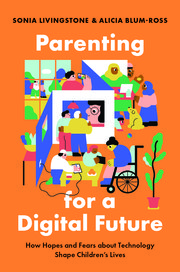In this author interview, we speak to Sonia Livingstone and Alicia Blum-Ross about their new book, Parenting for a Digital Future, which draws on interviews and a national survey with UK parents to explore how hopes and fears about digital technologies are shaping parenting today.
You can sign up to attend the launch of Parenting for a Digital Future, which is being held as an LSE online event on Thursday 24 September 2020.
Q and A with Sonia Livingstone and Alicia Blum-Ross, authors of Parenting for a Digital Future: How Hopes and Fears for the Future Shape Children’s Lives. Oxford University Press. 2020.
 Q: Parenting for a Digital Future approaches ‘digital parenting’ as involving ‘genres of practices’, whereby families move between embracing, balancing and resisting the digital. Why is it helpful to think of parenting in the digital age as genres or clusters of practices?
Q: Parenting for a Digital Future approaches ‘digital parenting’ as involving ‘genres of practices’, whereby families move between embracing, balancing and resisting the digital. Why is it helpful to think of parenting in the digital age as genres or clusters of practices?
We found such a diversity among families, contradicting the way that policymakers and the media generalise about families as if parents are all facing the same challenges and responding with the same anxiety. We felt that we had been given the opportunity for a unique set of insights – getting to peek behind the curtains of so many homes, over so many cups of tea, seeing how one parent might resist technology in the morning but embrace it by the evening. We learned that parents differ amongst themselves for many, often important, reasons, including within their own families – for example, partners conflicting in their approach to technology or parents with their own parents. By the end of the research we could identify patterns or types not so much of parents, but of parenting genres or practices. Parents are constantly expected to achieve the perfect balance between two often-contradictory injunctions: embrace technology because it is the future, or resist technology because of all the problems it brings. The book is an exploration of when, why and how parents shift among these genres of practice, in response to their hopes and fears about technology, and what consequences their practices have for their families.
Q: You invited parents to reflect on how they were parented in their childhood and their ideas of how their children might parent in the future. What was useful in thinking about past experiences and future visions in tandem?
Although popular attention to digital parenting is often focused on the here and now, we argue that parenting inevitably involves us – parents, society – in looking back and forward over several decades, to how things were, and will be, across the generations. A critical analysis of ‘parenting’ as a distinct phenomenon, and a social policy problematic, traces its dramatic rise to prominence over recent decades, with ever increasing social expectations of parenting linked to the transformations of late modernity, especially growing individualisation and a preoccupation with risk. These concerns are salient not only to academics but also to parents themselves. We asked parents to look back to their own childhood and then to imagine their children’s adulthood.
Looking back led them to highlight worries about the loss of traditional values, and the emergence of new risks, along with a sense that social support has waned and that parents tend to judge each other competitively. Here, the influx of digital technologies into the home and into our lives marks the difference between then and now, symbolising the changes that parents are living through. Looking forward revealed the impossible task parents face, to anticipate what will be of value in ten or twenty years’ time, and to try to prepare their child from the unknown and unknowable. Here too, we argue, digital technologies act like a lightning rod, attracting attention and not only crystallising deeper concerns about changing values and the individualised burden of risk, but also raising intense hopes for parents about ways to prepare their child for an imagined digital future.

Image Credit: Photo by Samantha Sophia on Unsplash
Q: You write that ‘demanding that parents just watch the clock misses the point of parenting in the digital age’. What do we risk overlooking when we reduce parental engagement with digital technology to policing children’s screen time?
The public exhortation to parents to police their children’s screen time is patronising in its assumption that parents are unable to make judgements about the value and content of their children’s digital activities. It is unhelpful in failing to guide parents in applying (too-) simple rules (e.g. no more than two hours per day) to the many and particular contexts they face. And it is disruptive insofar as parents are striving for a more democratic and cooperative approach to family life which allows for both shared pleasures, often media-related, and respect for family members’ different interests.
Ironically, we found parents conflicted with their children and each other more over screen time rules than over how children actually engaged with screens and why. Yet when we reviewed the literature on what is known as ‘parental mediation’, we found little evidence that restrictive approaches are a useful ‘tool’ for parents – especially in isolation. Rather the research suggests, and our interviews with parents bear out, that parents should and do employ a range of strategies. We suggest these should focus not on the length of time a child has watched a screen but on the quality of their experiences, considered in relation to content, context and social connections through and around their digital activities. So yes, setting limits has its place but so does playing and laughing together at a favourite show or at a favourite meme.
Q: Your book challenges assumptions that middle-class parents are more invested in ‘parenting the digital’ than working-class parents, but did the families you spoke to experience differences in their children’s digital experiences and know-how being converted into opportunities, recognition and reward outside the home?
Yes, of course. We found plenty of evidence that less privileged families are trying to promote their child’s prospects, whether using digital means or otherwise, and often their significant investment in and reliance on finding a digital pathway to overcome the other barriers they face was striking. This led us to contest the research of sociologist Annette Lareau who argued that middle-class parents practise what she calls ‘concerted cultivation’ (taking children to classes, individualistically pursuing ‘getting ahead’), whereas working-class families practise ‘natural growth’ (leaving children metaphorically and literally to their own devices). Instead we found that rich and poor parents alike have huge ambitions when it comes to what digital technologies will offer to their children’s learning – and become a way of ‘doing’ this intensive parenting.
But we agree with Lareau and others that parents are positioned in highly unequal ways, for disappointingly if unsurprisingly, the poorer families we interviewed faced many barriers as they sought digital pathways and workarounds for their children’s future. We visited lots of homes with broken or underused technology, and families lacking in the needed skills and unable to find sources of help, whether from their child’s school or their community or beyond. For example, we encountered both very wealthy and very poor families whose children were learning to code, but the degree to which the parents could support this interest with time, technology and further resources was wildly disparate – though both had the same interest and inspiration.
Q: You discuss how perceptions of ‘the geek’ have changed – once envisaged as an outsider, typically white and male, now a more diverse idea of the geek has been embraced, with ‘geeky’ skills valued as a potential asset. Did the families you spoke to see ‘the geek’ as an aspirational and relatable figure?
For some families, very much so. We interviewed several families who were self-described ‘geeks’ and had invested a considerable amount of time and resources into that identity. For some of these families this was in response to a sense of being out-of-step with society: for example, a home-schooling family with a child with special educational needs whose mother felt that leaning into geekiness could create an interest-driven learning space that school had failed to provide. However, some families resisted the ‘geek’ mantle even though they might have embraced it in practice. For example, we interviewed several parent bloggers who, on the one hand, told us proudly of their own digital skills gained through blogging or vlogging, but then said they did not want their children using technology and that they preferred them to have a ‘Famous Five’ upbringing. What’s interesting about today’s geeky families is that, far from being on the margins, as of old, they now illustrate the mainstream direction that so many families aspire to. As one mother said to us, talking of coding: ‘It’s the new Latin isn’t it? It’s like, if you couldn’t read or write 600 years ago, you were on the outside, you were a peasant. So in the new world you should know how to use HTML or you should be able to construct your own website, you should know some of the tools, you shouldn’t just be a passive user.’
Q: You make an interesting observation that talking about hopes and concerns regarding ‘digital parenting’ seemed easier for parents than talking directly about other issues that can impact families – including relationship conflicts, inequality, migration, racism and sexism. Why do you think the digital lends itself to being a relatively ‘safer’ space to touch on wider, often structural, concerns?
Talk about all things digital both fascinates parents and also provides a publicly-acceptable way of discussing difficult topics – loss of tradition, changing authority patterns in the family, poverty, migration, disability and more. Things that are often more invisible to parents than the glowing screen in their own or their child’s hand. So much of what families struggle with gets intensely focused on their uncertainties about, and conflicts over, the use of technology. Perhaps, too, it is easier to talk in relation to the digital, as this is a terrain in which, regardless of particular circumstances, everyone is interested, allowing even unequally distributed concerns to be addressed yet remain tacit. We also argue that focusing on the digital gives parents a greater sense of control, for there are practical steps they can take (buy a computer, enrol in a coding club, download educational apps, install a filter or limit screen time). By contrast, it is not easy for parents to take steps to secure the future for their disabled child, or resolve their marginal status as a migrant family, or cope with poverty or family breakdown. Yet, as we conclude, focusing family life on the terrain of the digital is hardly neutral in its effects, intensifying parents’ hopes and fears for their child, and adding to the uncertainties they must face.
Note: This interview gives the views of the author, and not the position of the LSE Review of Books blog, or of the London School of Economics and Political Science. The interview was conducted by Dr Rosemary Deller, Managing Editor of the LSE Review of Books blog.
Banner Image Credit: Photo by Charles Deluvio on Unsplash.







Fantastic Professor Livingstone and Dr Blum-Ross ! I look forward to securing my own copy.